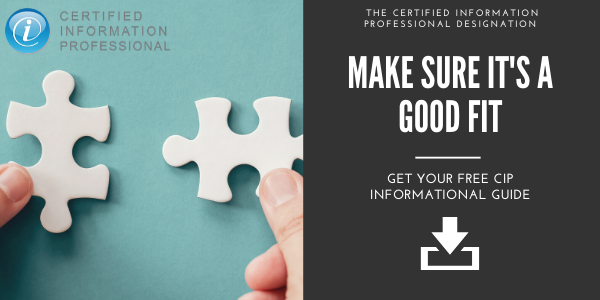
The Certified Information Professional (CIP) vs the Certified Records Manager (CRM): 7 Differences You Should Know
Electronic Records Management (ERM) | Certified Information Professional (CIP)
You're interested in an information management certification, and you've narrowed it down to two; the Certified Information Professional (CIP) vs. the Certified Records Manager (CRM). Both certifications are well-known, respected credentials in the information management industry. So what's the difference and which is right for you?
The honest answer is that it depends a lot on what you're looking for. Before we go any further, it's import to disclose that I'm an AIIM staffer and the lead architect of the CIP. But I have been a CRM since 2009 and a CIP since its launch in 2011, so I’m intimately familiar with both.
Here are the seven key differences I see between the two certifications as a holder of both:
-
Exam content and development. The CRM is a very deep dive into records management best practices, but it doesn’t go into as much depth on many other aspects of information management. The CIP exam addresses records management, in less depth, as one of many information management functions and processes within an organization, to provide the broader contextual picture.
The CIP and CRM are formal, psychometrically sound exams developed by subject matter experts and based on industry standards and global best practices. Both are multiple-choice exams.
The CRM consists of five separate 100-question multiple-choice exams and a four-hour written exam consisting of two case studies that demonstrate writing skills and the application of knowledge to solve RIM problems. This requires CRM candidates to analyze and apply the best practices identified in the multiple-choice exams.
The CIP exam is a single 100-question multiple-choice exam.
-
Specialization. The ICRM offers two specializations available to CRMs – the Nuclear Information and Records Specialist (CRM/NS) and the Federal Specialist. These are awarded to CRMs in good standing who pass an additional specialty exam. The CIP does not offer any specialization or additional designations.
-
Exam preparation. The ICRM offers 100 practice questions, 20 per exam part, and two case study practice questions for Part 6. They present pre-con prep workshops at major conferences and have endorsed CRM exam prep courses offered by ARMA chapters and select other industry associations. ICRM also recommends ARMA’s Essentials of RIM certificate program. And they have a CRM Mentoring program to match Part 6 CRM candidates with mentors.
AIIM offers a 100-question practice exam that mimics the exam weighting and timing of the real exam, as well as a library of on-demand training courses, all available in an affordable subscription called AIIM+, that cover the body of knowledge that makes up the CIP exam. A CIP study guide is free to all members of AIIM and available for $60 to non-members. Finally, each one of AIIM's training courses offers a deeper dive into one of the elements of the body of knowledge covered by the CIP exam.
-
Exam Experience. Both the CIP and all of the individual CRM exams, except Part 6, are available year-round; CRM Part 6 is only available during designated test windows. The CRM exam is available worldwide through the Pearson VUE testing network.
The CIP is available worldwide through the Kryterion testing network, and can be taken at a test center or using Kryterion’s online proctoring process.
-
Exam Price. If you compare just the cost of the exams, CIP is less expensive at $385 for a single exam vs. the total cost of the CRM for six exams of $750.00 in the U.S. and Canada ($900 outside). Some CRM candidates spread the exams out, so the cost for any one exam part is significantly lower ($100-$150).
-
Certification Maintenance. Both the CRM and the CIP require certificants to complete 20 hours of continuing education per year – CRM is 100 over five years, and CIP is 60 over three years. And both require a fee to maintain the certification. The CIP renewal fee is $150 every three years; the ICRM requires CRMs to be members of the ICRM at a cost of $200 per year.
-
Industry Acceptance. The ICRM includes active CRMs as well as CRAs and retired CRMs/CRAs in its online registry. At the time of writing, the number of active CRMs listed in the registry is 964. The current number of active CIPs is 789. Both the CRM and CIP are listed on job postings as requested, preferred, or even required qualifications for information management positions.
Which certification is right for you?
As I noted at the start of this post, it depends on your position, your career path, your organization’s support for certification and maintenance, and many other factors. But maybe the right answer is, “Yes.”
This combination of CIP and CRM provides an excellent way for professionals to demonstrate their “T-shaped skills” in information management. This is an HR concept where the vertical line of the “T” represents deep expertise in a particular domain or area, and the horizontal bar of the “T” refers to an understanding of where the deep-dive expertise fits in the overall picture. In this example, the CRM would be the deep dive, and the CIP would be the broader picture.
CIP and CRM complement each other very well, as shown by the number of industry information professionals that hold both. Whichever you pick, you’re making a significant statement about your commitment to professional growth and development.


![[Informational Guide] Is certification right for you? Get this free CIP Exam Guide to find out.](https://no-cache.hubspot.com/cta/default/332414/dcb32a30-373b-4f1b-9d7f-90425213921c.png)
